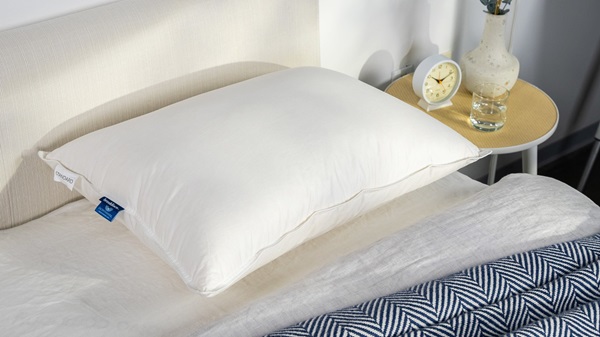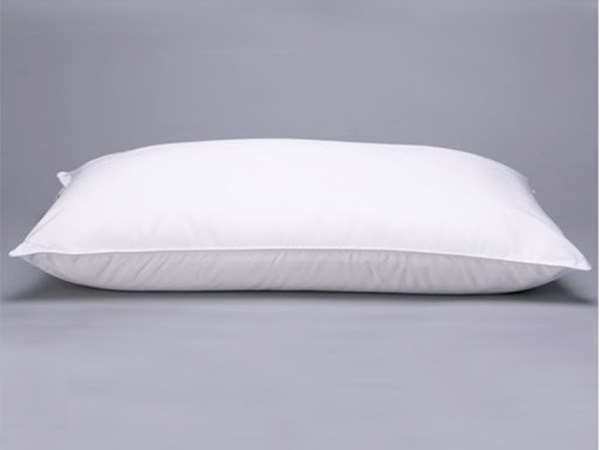Choosing the right pillow is crucial as it impacts the quality of your sleep, especially if you are dealing with neck pain. Firm and soft pillows are the most common and popular pillows in the market. They both have distinct advantages and drawbacks. Firm pillows provide robust support and help maintain proper spinal alignment, potentially reducing neck strain. On the other hand, soft pillows provide a plush, cushioned feel that many find comfortable but may lack the support needed to prevent neck pain. Understanding the differences between firm and soft pillows is essential for selecting the best option to alleviate neck discomfort and improve sleep quality.
Advantages and Disadvantages of Firm Pillows
A firm pillow provides more support for the neck than a softer pillow. It may help to reduce pain or stiffness in the neck and shoulders.
Similarly, a firm pillow is less likely to collapse during the night, ensuring consistent support.
Using a firm pillow in your bed aids in improving spinal alignment and reduces pain or stiffness in the neck and shoulders.

However, a firm pillow might be less comfortable than a softer one and may not offer as much pressure relief for the head and neck. Therefore, it’s important to choose a comfortable and supportive pillow.
What are the benefits of Medium-Firm Pillow?
People often have strong opinions when it comes to pillow firmness. Some people like a soft, fluffy pillow to sink into, while others prefer a firmer option for more support. However, the best pillow firmness is usually somewhere in the middle.
A medium-firm pillow offers the right balance of pressure relief and support, making it ideal for most people. It provides the perfect amount of give and support, making it the best option for most.
Benefits and Drawbacks of Soft Pillow
Some individuals find a soft pillow is perfect for a comfortable night’s sleep. Soft pillows offer gentle support for the head and neck and can be easily adjusted to fit any sleeping position. Similarly, They are often more affordable than firm pillows.
However, it also has some drawbacks. Soft pillows may not give enough support, potentially causing neck pain or headaches. Likewise, soft pillows may lose their shape quickly which leads to lumpy and uneven sleeping surfaces.
Difference Between Firm and Soft Pillows
The main difference between form and soft pillows lies in the support they provide. A firm pillow is quite hard and does not give much when pressed. While this might seem uncomfortable, it can be quite comfortable for some people. The hard surface offers a stable base for your head and helps reduce your neck from moving around too much while you sleep.

In contrast, soft pillows are squishy and conform to the shape of your head, which can relieve pressure for those who need it. However, they do not provide the same level of support as firm pillows.
Also read, Best Pillows For Traveling: Memory Foam vs Microbead Travel Pillow
Importance of Choosing a Good Pillows
Support & Spine Alignment
A pillow’s main job is to support your spine’s natural S-shaped curve while you sleep. Keeping this curve intact helps prevent strain, discomfort, and possible long-term health problems. The human spine naturally curves in an S-shape, and maintaining this curve is crucial to prevent strain, discomfort, and possible long-term health problems.
A good pillow offers sufficient support to the cervical spine, which is the neck portion of the spine. Proper support keeps your head and neck in a neutral position, neither too bent forward nor backward. This reduces the chances of waking up with stiffness or chronic pain.
You can find specially designed pillows like like Springfit’s Contour Medic in the market which are designed with a contoured shape that adapts to align your head, neck, and shoulders, promoting a more relaxing and restful sleep.
Reduce the risk of neck pain
You might have woken up with a stiff neck, finding it painful to move your head sometimes. This discomfort often stems from inadequate support for your neck and head or improper alignment during sleep. When your neck lacks proper support, muscles, and ligaments can strain or become irritated, causing pain and stiffness.

A well-designed pillow gently cradles the head and neck, distributing weight evenly and alleviating pressure points. This helps reduce strain on neck muscles and promotes correct spinal alignment, significantly lowering the likelihood of waking up with pain.
Adequate comfort all night long
A quality pillow not only provides the right support but also offers ample comfort which allows you to maintain your preferred position without constantly adjusting or waking up due to discomfort. One of the keys to comfort while sleeping is your pillow’s ability to relieve pressure points. When you lay your head on it, the weight of your head presses down on specific areas, such as your neck, shoulder, and head itself. An uncomfortable pillow can cause other pressure points to become sore and painful leading to constant tossing and turning.

A comfortable pillow provides support to your head, neck, and shoulders, minimizing the likelihood of waking up with pain or discomfort. This support helps you wake up feeling refreshed and prepared for the day ahead.
How To Pick The Best Pillow For You
Here are a few guides to choosing the right pillow for your needs,
For neck pain: If you are dealing with neck pain, choose a pillow that is both responsive and supportive. A responsive pillow molds to the shape of your head, offering pressure relief, while a supportive pillow maintains its shape to provide stability and support for your neck.
For Shoulder Pain: If you are experiencing shoulder pain, look for a soft and moldable pillow. A soft pillow will alleviate pressure on your shoulders, while a moldable pillow can be adjusted to suit your preferred sleeping position.

For Side Sleeper: If you are a side sleeper, try using a soft pillow that gives good support and is somewhat high. A soft pillow can reduce pressure on your head and neck, while a supportive one can keep your head in the right position and prevent it from moving while you sleep.
Stomach sleeper: If you sleep on your stomach, use a thin pillow with medium firmness. A thin pillow helps avoid pushing your head too far forward, while medium firmness provides support without causing neck or shoulder muscle tension and pain.
Frequently Asked Question
Who should consider using firm pillows?
Individuals experiencing neck pain or stiffness can benefit from firm pillows, as they provide stable support that helps alleviate pressure points and maintain proper spinal alignment throughout the night.
What are the advantages of using soft pillows?
Soft pillows offer a luxurious, plush feel and conform closely to the shape of the head and neck, offering a cradling effect that many find comforting. They are versatile and suitable for various sleeping positions, including stomach sleeping, as they allow the head to sink comfortably without straining the neck.
How do I choose between a firm and soft pillow?
Consider your sleeping position, personal comfort preferences, and any health needs you may have. Back and side sleepers generally benefit from firm pillows, while stomach sleepers and those who prefer a plush feel may prefer soft pillows. Testing pillows in-store or choosing options with good return policies can help you find the best fit.
How often should I replace my pillow?
Pillows should typically be replaced every 1-2 years to maintain optimal support and hygiene, especially if they begin to lose their shape or if you notice signs of wear and tear.
You may also like to read, Down Pillows vs Latex Pillows: Choosing the Best Option for Your Sleep
